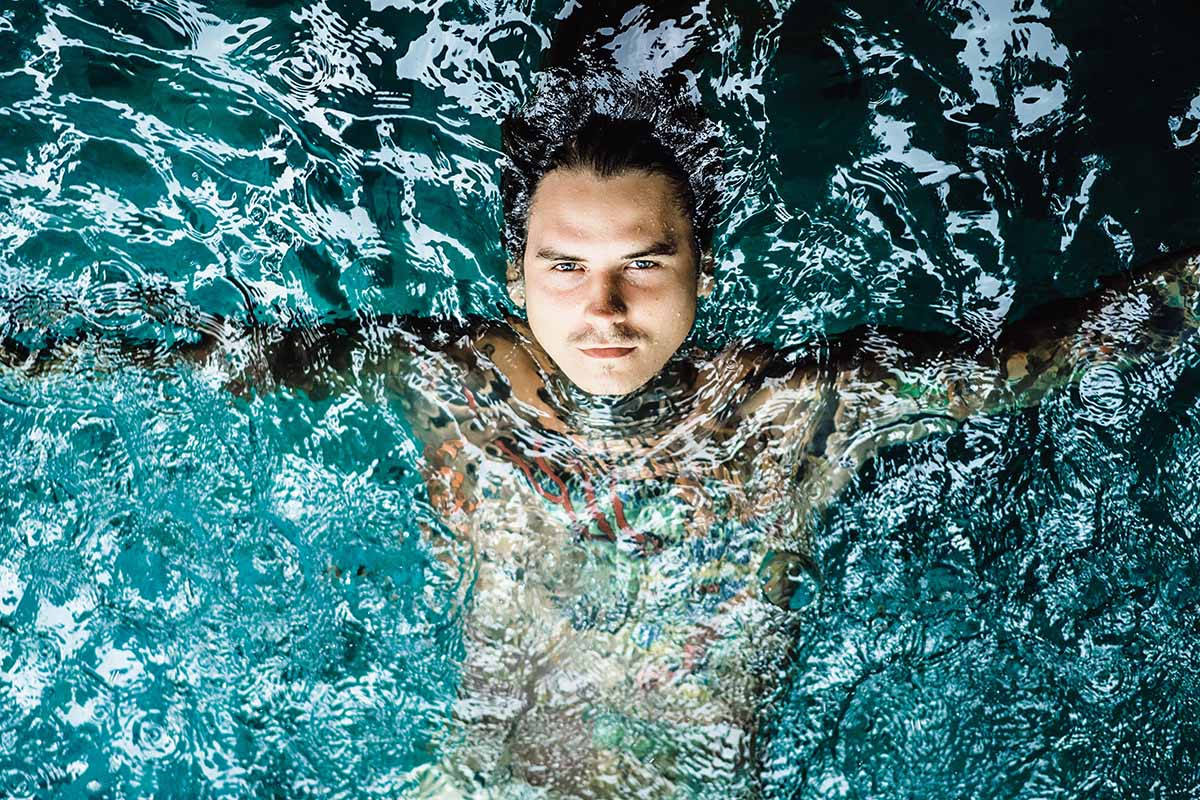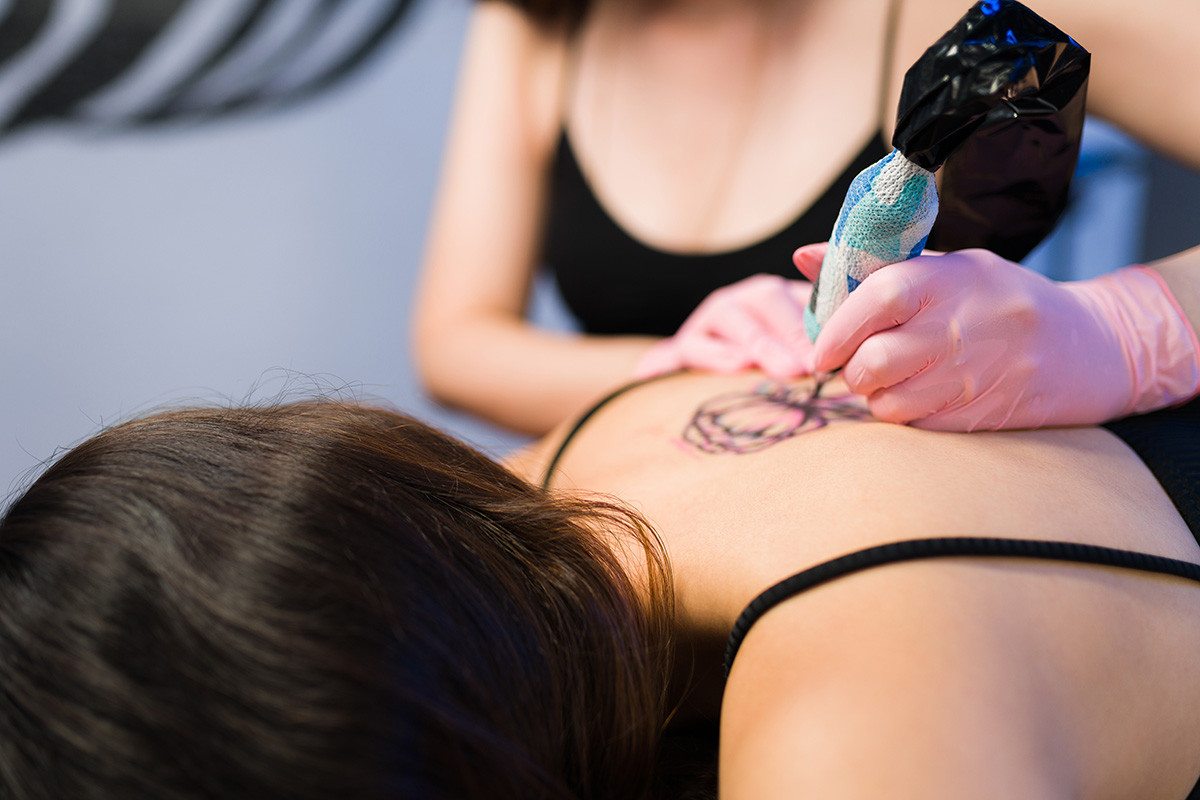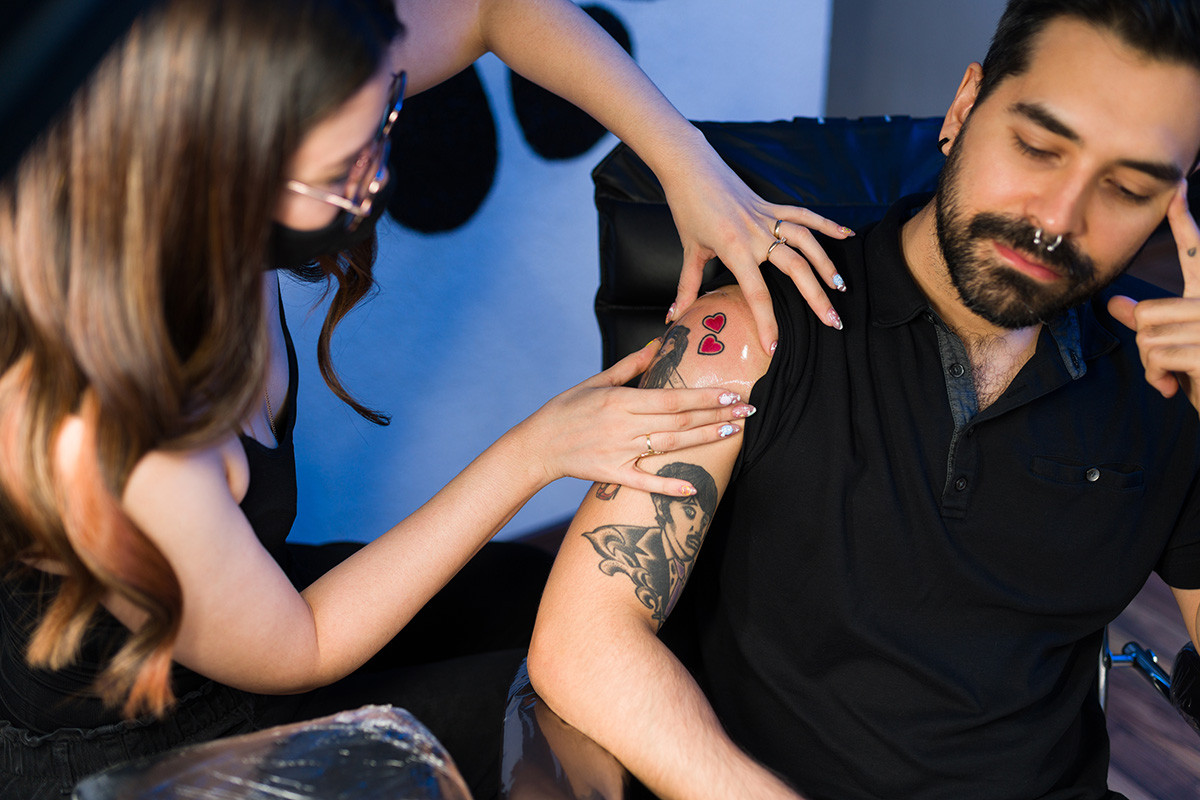Submerging a tattoo in water too soon can seriously mess with the healing process, potentially leading to infections and damage to your fresh ink. At tattooat.com, we provide expert insights on tattoo aftercare, including when it’s safe to swim, how to protect your tattoo, and signs of proper healing. Discover the best practices for maintaining your tattoo’s vibrancy and preventing complications with our advice on tattoo healing, submersion risks, and protective measures.
1. When Can You Dive In? Understanding Tattoo Healing
Getting a new tattoo is an exciting experience, but understanding the tattoo healing stages is crucial for optimal results. Tattoo artists typically recommend waiting 2-4 weeks before exposing your new tattoo to water like swimming pools, hot tubs, or open water.
 A person getting a new tattoo and the healing process
A person getting a new tattoo and the healing process
Healing times vary depending on tattoo size and location, skin type, and aftercare. To ensure the best outcome, knowing each stage and factors affecting healing time is essential.
2. What Are The Stages Of Tattoo Healing?
The tattoo healing process includes swelling, pain, and oozing initially, followed by itching, peeling, and continued aftercare. Full healing takes 2-4 weeks, sometimes up to 6 months. It’s important to avoid swimming and other activities that can irritate the skin and prolong healing.
While swimming might seem tempting, open water poses the greatest infection risk. Infections can delay healing and damage your tattoo, so patience is key before diving in.
3. What Factors Affect Tattoo Healing Time?
Several factors can impact tattoo healing time. These include:
- Tattoo Size: Larger tattoos naturally require more healing time.
- Tattoo Location: Some body areas heal slower than others.
- Aftercare: Proper aftercare reduces healing time.
- Swimming: Waterproof dressings can protect tattoos while swimming.
Individual skin types also affect healing time. Monitor the healing process closely and consult your tattoo artist with any concerns before water activities.
4. What Are The Risks Of Swimming With A Fresh Tattoo?
Swimming with a new tattoo can cause problems. Water dries the skin, increasing itching, flaking, and scabbing. This can lead to fading, patchiness, and blurred lines in your fresh ink.
Besides physical discomfort and tattoo damage, swimming with a new tattoo increases infection risk. Pools, lakes, and oceans harbor bacteria that can infect your open wound. To protect your tattoo and ensure smooth healing, avoid swimming until fully healed.
5. How Can Bacterial Infections Affect Fresh Tattoos?
Tattoos break the skin, introducing ink into the body, creating an open wound. Submerging your healing tattoo exposes it to bacteria in pools, lakes, and oceans, leading to irritation, infection, and complications that harm your tattoo and prolong healing.
To minimize bacterial infections, keep your new tattoo clean and protected from water. Waterproof dressings shield your tattoo from bacteria while swimming. Being cautious is best for your tattoo’s health.
6. How Do Chlorine and Salt Water Affect Tattoos?
Chlorine and salt water can negatively affect your fresh tattoo. Exposure to these elements can cause:
- Irritation
- Fading
- Discoloration
- Ink Leaching
Even in chlorinated pools, chlorine doesn’t eliminate all bacteria, posing a risk to your healing tattoo.
Additionally, chlorine and salt water dry the skin, worsening irritation and prolonging healing. To ensure proper healing and maintain vibrancy, avoid swimming until your tattoo is fully healed.
7. How To Protect Your New Tattoo While Swimming?
If swimming is essential before your tattoo heals, take precautions to protect it. While not ideal, waterproof dressings can shield your tattoo from water and bacteria. Remove the dressing immediately after swimming and thoroughly clean your tattoo to minimize infection risk.
 A person protecting their new tattoo while swimming with waterproof dressings and bandages
A person protecting their new tattoo while swimming with waterproof dressings and bandages
Remember, swimming with a new tattoo is not recommended, and precautions don’t guarantee safety from infection or damage. Waiting until your tattoo is fully healed is best, but if you must swim, take necessary protective steps.
8. What Are The Best Waterproof Dressings and Bandages For New Tattoos?
Waterproof dressings and bandages are essential if you need to swim with a new tattoo. These coverings create a barrier between your tattoo and the water, protecting it from bacteria and contaminants.
Some of the best waterproof dressings for new tattoos include:
| Dressing | Description |
|---|---|
| Saniderm Tattoo Aftercare Bandage | A popular waterproof dressing known for its breathability and flexibility. |
| Recovery Derm Shield Tattoo Aftercare | Provides a strong barrier against water and bacteria, promoting faster healing. |
| Tattoo Aftercare Waterproof Bandage | Specifically designed for tattoo aftercare, offering reliable protection. |
| Nexcare Tattoo Bandages | Offers a comfortable and secure fit, keeping water out effectively. |
| Nuanchu Waterproof Bandage | A versatile option providing waterproof protection and promoting a moist healing environment. |
Apply the dressing before swimming, remove it immediately after, and change it regularly to ensure your tattoo remains protected.
9. What Post-Swim Tattoo Care Is Needed?
After swimming, it’s crucial to clean and care for your tattoo to minimize infection and damage risk. Here’s what to do:
- Gently wash the tattoo with warm water and mild soap.
- Pat the area dry with a clean towel.
- Apply a thin layer of fragrance-free moisturizer to keep the skin hydrated and promote healing.
Post-swim care is vital to maintaining your tattoo’s health and appearance. By protecting your new ink, you ensure smooth healing and enjoy your beautiful tattoo for years.
10. What Are The Signs A Tattoo Is Ready For Swimming?
Once fully healed, you can safely swim without worrying about damage or infection. How do you know when your tattoo is healed and ready for swimming? Key signs include no redness, itching, scabbing, or flaking, plus a smooth, even appearance without peeling.
If unsure, consult your tattoo artist or a medical professional before swimming. They can assess your tattoo’s healing progress and advise when it’s safe to dive in.
11. What Visual Indicators Show A Tattoo Is Healed?
Visual indicators help determine if your tattoo is ready for swimming. Look for:
- No bubbling or degradation
- No redness or peeling
- A smooth, even appearance without flaking or scabbing
If your tattoo meets these criteria, it’s likely healed and safe to expose to water.
Healing varies, so monitor your tattoo closely. If you have concerns or notice unusual symptoms, contact your tattoo artist or a medical professional.
12. Why Should You Consult Your Tattoo Artist About Swimming?
Your tattoo artist is invaluable in determining when your tattoo is ready for swimming. They have healing process experience and can assess your tattoo’s progress, providing expert advice on when it’s safe to expose your ink to water.
If unsure, visit the studio where you got tattooed for a professional check. It’s best to be cautious and ensure your tattoo is fully healed before swimming. Portland State University’s Art Department recommends consulting with the tattoo artist for signs of Tattoo readiness based on their professional experience, in July 2025.
13. What Alternative Water Activities Can You Do During The Tattoo Healing Period?
If you want to get in the water while your tattoo heals without risking damage, consider alternative activities. Instead of swimming, take gentle showers and avoid direct water jets. Boiling tap water for cleansing minimizes infection risk.
 A person enjoying alternative water activities during the tattoo healing period
A person enjoying alternative water activities during the tattoo healing period
Keeping your new tattoo clean and protected from water is essential during healing. By choosing alternative water activities, you enjoy the water while ensuring your tattoo heals properly.
14. Why Are Hot Tubs, Saunas, and Other Water Hazards Dangerous For New Tattoos?
Hot tubs and saunas are relaxing but pose risks to your new tattoo if used too soon after getting inked. The warm, moist environment in hot tubs and saunas increases infection risk and hinders tattoo healing. Waiting at least 3-4 weeks after tattooing is recommended before entering a hot tub or sauna.
Avoiding these environments during healing protects your new tattoo and ensures proper healing. Once fully healed, you can enjoy your favorite water activities without worry.
15. What Are The Key Takeaways About Tattoo Submersion In Water?
Understanding tattoo healing and the risks of swimming too soon is crucial for protecting your new artwork. Following aftercare guidelines, using waterproof dressings when necessary, and waiting until your tattoo is fully healed ensures smooth healing and maintains your tattoo’s vibrant appearance.
Prioritize the health and safety of your new tattoo, whether you’re a seasoned enthusiast or first-timer. Before diving into water, ensure your tattoo is ready – patience is key to preserving your ink’s beauty.
16. FAQs About Tattoo Submersion In Water
16.1. What Happens If You Swim While Your Tattoo Is Healing?
Swimming with a new tattoo can be dangerous, exposing your wounded skin to bacteria in the water that can cause infections ranging from mild to severe. It can also irritate the skin, resulting in major itching, oozing blisters, and hives.
Avoid swimming entirely while your tattoo is healing to protect it.
16.2. Can I Swim 7 Days After A Tattoo?
It is advised to wait for your tattoo to fully heal, which can take at least two to four weeks before swimming in any kind of water.
Going into the pool or ocean before then may put you at risk of infection due to bacteria or germs that can enter an open wound.
16.3. How Long After A Tattoo Can You Swim In Chlorine?
Wait at least two weeks and up to four to six weeks after getting a tattoo before swimming in chlorine-filled water.
Don’t risk infection by going into the pool or hot tub too early!
16.4. Can I Use Waterproof Dressings To Protect My Tattoo While Swimming?
Yes, you can use waterproof dressings to protect your tattoo while swimming – just make sure it’s fully healed before you do!
16.5. What Are The Risks Of Swimming With A Fresh Tattoo?
Swimming with a fresh tattoo carries the risk of bacterial infections, skin irritation, and damage to the design, so it is best avoided for the first few weeks after getting a new tattoo.
It is important to take the necessary precautions to ensure that your tattoo heals properly and looks its best. Taking the time to wait before swimming can help you avoid any potential problems.
16.6. Can I Take A Bath After Getting A Tattoo?
Avoid taking baths for at least two weeks after getting a tattoo. Soaking in water can increase the risk of infection and interfere with the healing process. Showers are preferable, but avoid direct water pressure on the new tattoo.
16.7. What Type Of Soap Should I Use To Wash My New Tattoo?
Use a mild, fragrance-free, and antibacterial soap to wash your new tattoo. Avoid soaps with harsh chemicals, perfumes, or dyes, as these can irritate the skin and interfere with healing. Some recommended options include:
- Cetaphil Gentle Skin Cleanser
- Dove Sensitive Skin Unscented Beauty Bar
- Dr. Bronner’s Pure-Castile Liquid Soap (Baby Unscented)
16.8. How Often Should I Moisturize My New Tattoo?
Moisturize your new tattoo 2-3 times a day, or whenever the skin feels dry. Use a fragrance-free, hypoallergenic moisturizer to keep the skin hydrated and promote healing. Some recommended options include:
- Aquaphor Healing Ointment (use sparingly)
- Eucerin Advanced Repair Cream
- Lubriderm Daily Moisture Lotion
16.9. What Should I Do If My New Tattoo Shows Signs Of Infection?
If your new tattoo shows signs of infection, such as increased redness, swelling, pain, pus, or fever, seek medical attention immediately. Do not attempt to treat the infection yourself, as this can worsen the condition.
16.10. Can Sun Exposure Affect My New Tattoo?
Yes, sun exposure can damage your new tattoo and cause fading or discoloration. Avoid direct sun exposure on your new tattoo during the healing process, and always apply a high SPF, broad-spectrum sunscreen to protect it once it is fully healed.
Ready to explore stunning tattoo designs, find talented artists, and learn more about tattoo aftercare? Visit tattooat.com now to dive into the world of tattoos! Find inspiration, expert advice, and connect with top artists to bring your tattoo vision to life. Our comprehensive guides and curated lists ensure you have everything you need for a successful and vibrant tattoo journey.
Address: 1825 SW Broadway, Portland, OR 97201, United States.
Phone: +1 (503) 725-3000.
Website: tattooat.com.